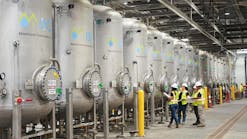GRESHAM, OR, April 23, 2015 -- On Wednesday, April 22, the city of Gresham, Ore., celebrated achieving net-zero-energy (NZE) status at its wastewater treatment plant -- one of only a handful of facilities in the United States to achieve the rating. Serving as the Pacific Northwest's first NZE wastewater treatment plant, the Gresham utility produces about the same amount of electricity as it consumes in a year, saving tax dollars and protecting the environment. Further, organic matter from the plant's wastewater now fuels 92 percent of its power using a process that turns this sludge into biogas.
Gresham has nearly doubled its biogas production since 2012, when haulers started trucking in wastewater filled with fats, oils and grease (FOG) from Portland-area restaurants and food service establishments. All this biogas is fed into two powerful engines that convert it to heat and electricity, which is used at the plant, with excess electricity sent out to the Portland General Electric grid. At the end of each year, any electricity not used by the plant is used to help families that receive energy assistance from General Electric.
The remaining 8 percent of the power that the plant produces comes from a 1,902-panel ground-mounted solar array. By adopting these clean energy technologies, and making the plant more energy-efficient, Gresham is estimated to save $500,000 per year in electrical costs. The plant also makes money, bringing in around $250,000 per year in fees for accepting FOG from regional food establishments.
The NZE achievement is the result of a decade of leadership, planning and persistence. Faced with rising utility bills and limited city funds, Alan Johnston, a senior engineer with Gresham's Department of Environmental Services, began crafting a long-term plan and formed an energy management team to get the plant to cut energy usage and produce its own power. Johnston partnered with the nonprofit Energy Trust of Oregon, the Oregon Department of Energy and Veolia, an international water, waste and energy management company, to fund and implement energy-saving solutions.
In 2005, Gresham purchased its first modern co-generator, the industrial engine that burns biogas to produce electricity and heat. In 2010, the city added the solar array. In 2012, it started trucking in FOG, which nearly doubled biogas production, and in 2014, it tripled storage capacity for FOG. In January 2015, it added its second co-generator -- which pushed the plant into NZE status. Over the past decade, Gresham cut power usage by 17 percent by making the plant more energy efficient by purchasing energy-saving equipment and improving operations.
In all, Energy Trust provided more than $1.3 million in cash incentives to Gresham for energy production and energy-efficiency investments at the plant, as well as technical assistance and project development support. The company won the 2014 State Leadership in Clean Energy Award from the Clean Energy States Alliance for its long-term work with the city. Likewise, the Oregon Department of Energy provided almost $2.2 million in transferable tax credits.
See also:
"Research program to study NZE solutions for wastewater treatment plants"
"WERF expands research on energy-neutral wastewater treatment plants"
###


